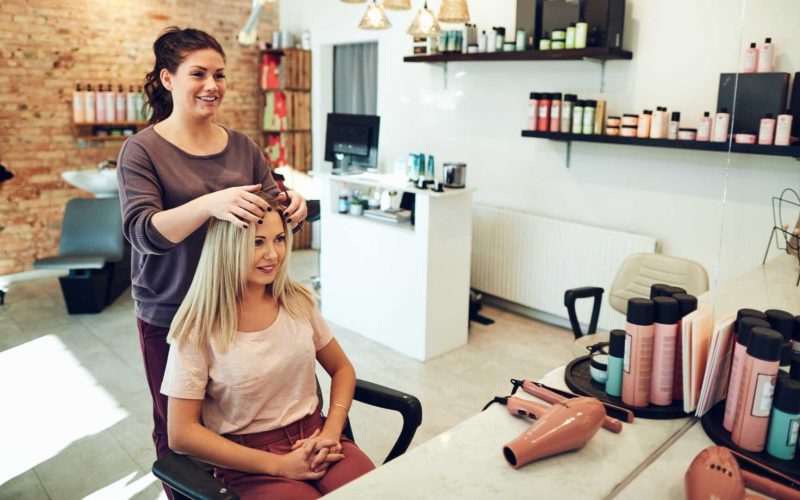Have you always had a passion for beauty and dreamed of starting your own beauty business in the UK? Starting a beauty business can be a fulfilling career, but it requires a lot of work, dedication, and research to make it successful. In this blog, we will guide you through the step-by-step process of starting your own beauty business in the UK. We will discuss the latest trends in the industry, potential customers, competition, services you can offer, quality standards, pricing strategies, the importance of a business plan, registration and licensing requirements, legal considerations, and how to provide excellent customer service. So let’s get started on making your dream a reality!
What is a Beauty Business?

A beauty business in the UK refers to any business that provides beauty-related services or sells beauty products. This can include salons, spas, nail bars, hairdressers, makeup artists, and retailers of cosmetics and skincare products. Beauty businesses are a thriving industry in the UK, with a wide range of services and products available to meet the needs and preferences of consumers. Whether you’re looking for a relaxing spa day or the latest beauty trends, there is no shortage of options for beauty businesses in the UK.
Latest Trends in the Beauty Business

The beauty business is always changing and evolving. What’s popular today may be gone tomorrow. So, what are the latest trends in the beauty business?
- Clean beauty: Consumers are increasingly seeking out products that are free from harmful chemicals and are more environmentally friendly.
- Natural ingredients: Natural ingredients, such as plant extracts and essential oils, are gaining popularity in beauty products due to their perceived benefits for the skin and overall well-being.
- Sustainability: Brands are incorporating sustainable practices into their operations, such as using eco-friendly packaging materials and implementing recycling programs to reduce waste.
- Inclusivity and diversity: Beauty companies are embracing a more inclusive approach by expanding their shade ranges to cater to diverse skin tones and featuring models of various ethnicities and body types in their advertisements.
- Personalization: Customized beauty products and personalized skincare routines are on the rise as consumers seek individualized solutions that cater to their specific needs and preferences.
- Wellness-focused beauty: The concept of beauty from within is gaining traction, with more brands focusing on products that promote overall well-being, such as supplements and products that emphasize self-care and stress relief.
- Technology integration: Beauty brands are incorporating technology into their products and services, including virtual try-on tools, AI-powered skincare analysis, and smart devices for skincare treatments at home.
- Social media influence: Social media platforms, particularly Instagram and YouTube, continue to play a significant role in shaping beauty trends, with influencers and beauty gurus setting the bar for what is considered desirable and aesthetically pleasing.
- Gender-neutral beauty: Traditional gender norms are being challenged in the beauty industry, leading to the rise of gender-neutral products and campaigns that appeal to individuals of all genders.
- Transparency: Consumers are demanding more transparency from beauty brands regarding their ingredients, manufacturing processes, and ethical practices, driving companies to provide detailed information and be accountable for their claims.
How to Start a Beauty Business in the UK?

Starting a beauty business in the UK can be an exciting and rewarding venture. Here are some steps to help you get started:
- Research the market: Before diving into starting your beauty business, it’s important to research the market and understand the demand for your services. Identify your target audience and competitors to determine where there may be gaps or opportunities in the market.
- Create a business plan: A well-thought-out business plan is essential for any new venture. Outline your goals, target audience, marketing strategies, pricing structure, and financial projections. This will help you stay organized and serve as a roadmap for your business.
- Register your business: In order to operate legally in the UK, you’ll need to register your beauty business with the appropriate authorities. This may include registering as a sole trader or setting up a limited company. Additionally, you may need to obtain specific licenses or certifications if you plan on offering certain treatments or procedures.
- Source suppliers and products: Find reputable beauty products and equipment suppliers. Consider factors such as quality, pricing, and delivery options when choosing suppliers. It’s also important to ensure that the products you use meet all safety and regulatory requirements.
- Set up your salon or studio: If you’re planning on having a physical location for your beauty business, find a suitable space and set it up according to your brand aesthetic. Consider factors such as location, interior design, layout, and necessary permits or licenses.
- Market your business: Develop a marketing strategy to create awareness about your beauty business and attract clients. Utilize both online and offline channels such as social media platforms, local directories, partnerships with other businesses, and hosting promotional events.
Who are the Potential Customers for Your Beauty Business?
Identifying your potential customers is crucial in building a successful beauty business. Your target audience will depend on the specific products or services you offer, but there are some common groups that tend to be interested in beauty products and services. These can include individuals interested in skincare and beauty routines, those who want to enhance their appearance for special occasions or events, and people looking for solutions to specific beauty concerns such as acne or ageing skin.
Additionally, it’s important to consider factors such as age, gender, and location when defining your target audience. Conducting market research and understanding the needs and preferences of your potential customers can help you tailor your marketing efforts and better serve your target audience.
What Competition Will Your Beauty Business Face in the UK?
Starting a beauty business in the UK means entering a competitive market. With a thriving beauty industry and a wide range of established competitors, it’s important to be aware of your competition. In the UK, there are various types of beauty businesses that you may come up against, including salons, spas, cosmetic stores, online retailers, and independent beauty professionals.
Each of these sectors has its own unique strengths and customer bases, so it’s essential to research and identify your target audience and find ways to differentiate your business from the competition. By understanding the landscape and staying on top of trends and consumer demands, you can position your beauty business for success in the UK market.
What Services Will Your Beauty Business Offer?

There are endless possibilities when it comes to the services your beauty business can offer. It all depends on your target market, what they are looking for, and what you are able to provide. Here are a few ideas to get you started:
- Hair Styling: This can include anything from simple cuts and trims to more complex styles like updos and colour treatments.
- Makeup Application: Offering makeup services is a great way to attract clients who want to look their best for special occasions or everyday life.
- Skincare Services: Skincare services are always in demand, from facials and waxing to more specialized treatments like microdermabrasion and chemical peels.
- Nail Services: Manicures, pedicures, and nail art are just a few of the possibilities when it comes to offering nail services.
No matter what services you decide to offer at your beauty business, make sure that you are providing quality work that your clients will love.
Quality Standards in the Beauty Business

There are many different quality standards in the beauty business. Some companies require their employees to have a certain level of education, while others focus on customer service or product quality. The most important thing is to find a company that meets your needs and expectations.
One way to ensure you’re getting the best possible service is to research the company before you make an appointment. Read online reviews, check with the Better Business Bureau, and ask friends or family for recommendations. Once you’ve found a few reputable companies, call or visit them in person to get a feel for their environment and staff.
When it comes to product quality, look for brands that use high-quality ingredients and have positive customer reviews. Avoid products that contain harsh chemicals or artificial fragrances, as these can cause skin irritation or other problems. Instead, opt for natural or organic products whenever possible.
Don’t forget about your own personal standards of beauty. Whether you prefer a simple makeup routine or want to experiment with different styles, finding products and services that make you feel good about yourself is important. With so many options available, there’s no reason to settle for anything less than perfect!
Importance of a Business Plan in the Beauty Industry
Having a business plan is crucial in the beauty industry for several reasons. Firstly, it helps you define your goals and objectives, allowing you to have a clear direction for your business. It also helps you identify your target market and understand their needs and preferences, enabling you to tailor your products or services accordingly. Additionally, a well-written business plan can attract potential investors or lenders who may be interested in supporting your venture. It can also serve as a roadmap for your business, helping you make strategic decisions and navigate challenges along the way.
Registering and Licensing Your Beauty Business in the UK
Registering and licensing your beauty business in the UK is an important step in ensuring that you are operating legally and ethically. There are several key aspects to consider when going through this process. First, you will need to register your business with Companies House, which involves providing information about your company’s structure, directors, and shareholders.
Additionally, depending on your specific services, you may need to obtain additional licenses or permits from local authorities or regulatory bodies. For example, if you offer tattooing or piercing services, you will need to register with your local council and comply with health and safety regulations. It is essential to research and understand all the necessary requirements for your particular beauty business and ensure that you meet all the legal obligations before starting operations.
Understanding the Legal Requirements for a Beauty Business
As a beauty business owner, it is important to understand the legal requirements for your business. A variety of laws and regulations apply to businesses in the beauty industry, including licensing requirements, health and safety regulations, and advertising standards.
To ensure that your business is in compliance with all relevant laws and regulations, you should consult with an experienced business attorney. An attorney can help you navigate the complex legal landscape of the beauty industry and ensure that your business is in compliance with all applicable laws.
How to Provide Excellent Customer Service in a Beauty Business?

Providing excellent customer service is crucial in the beauty business. Here are some tips to ensure your customers have a positive experience:
- Train your staff: Make sure your employees are well-trained in all aspects of customer service, including product knowledge, communication skills, and problem-solving.
- Listen and communicate effectively: Take the time to listen to your customers’ needs and concerns. Effective communication can help you understand their expectations and provide them with personalized recommendations or solutions.
- Create a welcoming atmosphere: Ensure that your salon or spa is clean, comfortable, and inviting. A pleasant environment can enhance the overall experience for your customers.
- Be responsive: Respond promptly to customer inquiries, whether it’s through phone calls, emails, or social media. This shows that you value their time and are committed to addressing their concerns.
- Go above and beyond: Surprise your customers with small gestures of appreciation, such as offering complimentary beverages or samples of new products. These little extras can leave a lasting impression and make them feel valued.
By implementing these strategies, you can create a beauty business that is known for its exceptional customer service and build long-lasting relationships with your clients.
Conclusion
Starting a beauty business in the UK requires careful planning and attention to detail. It is essential to stay updated with the latest trends in the industry and understand your potential customers and competition. Providing high-quality services at competitive prices is crucial for success. Additionally, having a solid business plan and complying with all legal requirements is necessary. Registering and licensing your beauty business ensures legitimacy and builds trust with customers. Finally, delivering excellent customer service is key to building a loyal clientele base. By following these steps, you can lay a strong foundation for your beauty business and thrive in the competitive industry.









